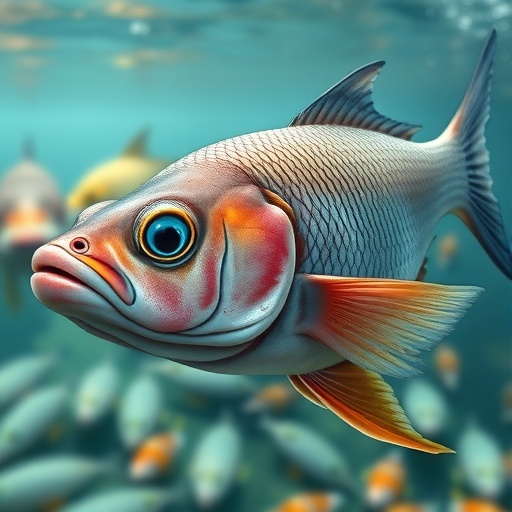In recent years, the global aquaculture industry has emerged as a cornerstone of food production, particularly as the demand for protein continues to rise amidst growing populations. However, this burgeoning sector faces critical challenges primarily related to its feed supply, particularly the reliance on fishmeal and fish oil derived from wild forage fish. The vulnerability associated with these feed sources raises significant concerns about the future sustainability of aquaculture. Recent research has delved into the implications of potential shortfalls in forage fish supplies, painting a sobering picture that could reshape the landscape of global seafood production.
The backbone of many aquaculture operations hinges on the availability of fishmeal and oil obtained from wild-caught forage fish. These small, schooling fish serve as a vital dietary component for various carnivorous aquaculture species. However, the erratic availability of these species and the fluctuations in their market cost present formidable risks. The ongoing pressures on wild fish populations, exacerbated by overfishing, habitat degradation, and climate change, stress the need for alternative solutions in feed production for aquaculture.
In a groundbreaking study, researchers have developed a model to assess the potential impact of various forage fish supply scenarios on the fed aquaculture sector. This innovative model reveals that the pressures on forage fish populations could lead to a shortfall ranging from 4.5% to 19.4%, resulting in a dramatic decline in aquaculture production by 8% to 35.2%. The implications of such declines could be catastrophic, particularly for countries that focus heavily on the cultivation of carnivorous species, which rely extensively on these feeds.
Leading aquaculture-producing nations like China, which dominates the global market, could experience debilitating impacts on their production capabilities. This reliance on forage fish underscores the systemic vulnerabilities within the aquaculture supply chain. The results of this study highlight an urgent call to action within both the fishing and aquaculture industries to address these risks and find sustainable solutions.
To maintain current levels of aquaculture production despite the anticipated declines in forage fish availability, the researchers suggest that approximately 1.8 million tonnes of alternative feed ingredients will be necessary annually. This figure emphasizes the critical need for innovation and investment in alternative protein sources, such as plant-based proteins, insect meal, and microbial proteins, to reduce dependence on diminishing wild fish stocks. Such alternatives must not only be cost-effective but also nutritionally adequate to sustain the health and growth rates of farmed species.
In addition to exploring alternative feeds, sustainable fisheries management practices must be strengthened to ensure long-term viability of forage fish populations. Governments and industry stakeholders must work collaboratively to implement policies that promote responsible fishing practices and protect critical marine ecosystems. This approach will not only benefit the aquaculture sector but also support the overall health of ocean fisheries and biodiversity.
Climate change further complicates the already precarious situation of forage fish supplies. Altered ocean temperatures and changing marine ecosystems may impact forage fish populations, reducing their availability and exacerbating competition among predators. Given the interconnectedness of climatic factors and aquaculture feed supplies, it is imperative to incorporate climate resilience into strategic planning for sustainable aquaculture.
Industry stakeholders must look beyond immediate threats and consider the broader implications of forage fish shortfalls on food security. Aquaculture has the potential to alleviate pressures on wild fisheries, but only if it is managed sustainably. Addressing the shortcomings in feed supply could ensure that aquaculture remains a viable source of protein for billions of people worldwide.
The shift towards assessing and implementing alternative feed solutions requires collaboration among scientists, aquaculture producers, and policymakers. Advances in biotechnology hold promise for developing sustainable feed options that can replace or supplement traditional feeds without compromising the quality of the end products. Additionally, encouraging consumer awareness about the benefits of alternative protein sources can drive demand and support transitions within the industry.
Educational initiatives aimed at aquaculture farmers can facilitate the adoption of novel feed ingredients and techniques. By cultivating a culture of innovation and adaptation, the aquaculture sector can bolster its resilience against future challenges. The future of global aquaculture hinges on the collective effort of stakeholders in recognizing the magnitude of the issue and enacting proactive measures to safeguard food security for generations to come.
As the situation stands, the balance between aquaculture’s growth and the sustainability of forage fish populations is precarious. The findings from this recent research offer critical insights into the potential consequences of neglecting the supply risks associated with fishmeal and oil. The aquaculture sector must pivot towards sustainable practices to continue thriving and fulfilling its crucial role in global food supply chains.
Ultimately, the fate of global aquaculture rests in the hands of stakeholders committed to fostering sustainability and innovation. The challenges posed by forage fish shortfalls serve as a rallying cry for concerted action across the board, urging a shift in paradigms and practices in favor of long-term viability and resilience in aquaculture production.
Subject of Research: The impact of forage fish supply shortfalls on global fed aquaculture production.
Article Title: Unstable supply and future shortages of wild forage fish heighten risks to global fed aquaculture production.
Article References: Liu, Y., Jiang, Z., Cottrell, R.S. et al. Unstable supply and future shortages of wild forage fish heighten risks to global fed aquaculture production. Nat Food (2025). https://doi.org/10.1038/s43016-025-01254-4
Image Credits: AI Generated
DOI: https://doi.org/10.1038/s43016-025-01254-4
Keywords: aquaculture, forage fish, feed supply, sustainability, alternative protein sources, climate change.




